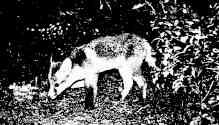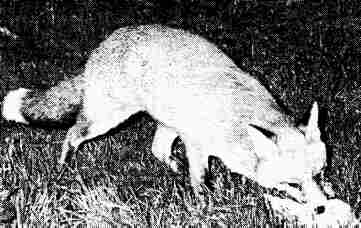After plague, foxes set for welcome comeback


WELCOME VISITOR: Jane and Len Harris'
vixen feeding in their Bishopston garden
"My foxes became my pets"
For Bristol residents Jane and Len Harris, losing the foxes they had
been feeding for the last three years was as upsetting as losing a pet.
"We'd had one particular vixen coming to us at our home in
Bishopston for three years," she said.
"We'd watched her bring up several litters of cubs and at one time
we were feeding as many as eight foxes. I would go down to the
butchers and buy four or five pounds of chicken carcasses every day
for them.
"They would come whenever you called them. If their food wasn't
there on time they would come into the house to find it.
Scraps
"They always came around dusk. I caught them peering around the
door a few times. THey would even feed from your hands if you
offered it to them.
"When we went on holiday I did just what people do if they had
pets. I paid the boy next door to come and feed them every day
and my neighbors put scraps of food out."
Now they are all gone -- all died of mange -- but Mrs Harris
is delighted that two new foxes have returned to the area.
"We've seen a dog and a vixen," she said.
|
|
Urban terrorists or welcome wildlife, Bristol's 20th century
foxes will be back for the 21st century after virtually being
wiped out by a plague, say scientists.
In the leafy suburbs of Stoke Bishop, Westbury-on-Trym and
Downsend, 99 per cent of foxes studied by a group at
Bristol University have died in the last 18 months.
"There were so many foxes living in Bristol that it was like
a timebomb just waiting to go off," said Dr Phil Baker.
Nuisance
"Some people were pleased to see the back of them as they
can be a nuisance."
But you can't keep a good fox down and Dr Baker is confident
the cunning creatures will return soon.
"They have repopulated other towns and cities after being
wiped out," he said.
"It may be that some have already developed an immunity to
the disease -- a virulent form of mange -- or that country
foxes will move into the city and once they do they will
breed very quickly.
"Love them or loathe them, the people of Bristol are going
to have to live with them again."
The scientists have no idea where the epedemic started but
they say it could have been brought into the city by a rural
fox or by an infected dog. It is caused by mites which burrow
into the fox's skin and cause terrible itching.
"Imagine how you feel when you have an itch and can't stop
it," said Dr Baker.
"Infected foxes may have millions of mites. The stress is
enormous. They quickly lose weight, get other skin infections
and die."
In 18 months, the city's huge population of about 220 adult
foxes and up to 800 cubs was decimated to a total of around
150 adults and pups. Ironically, most of the survivors were
those who befriended their worst enemy, man.
"Some were so friendly and trusting that they were being
fed by hand by animal lovers across the city. People were
able to treat them with an oral insecticide in their food
which killed the mites although it didn't make them immune.
"But it was impossible to stop the epedemic because we
couldn't treat all the foxes. Some were too shy or evasive
to catch.
"We applied for a license to treat the animals with the
insecticide, Ivermectin.
Toxic
"We were turned down by a veterinary authority because it
wasn't licensed for dogs and cats and could even be quite
toxic to some.
"A few vets offered it to people who they knew were feeding
foxes by hand and some of these may have lived."
These survivors will soon form new family units and restock
the city with foxes, says Dr Baker, although probably not in
quite the same high numbers Bristol was once famous for. But
if you had foxes at the bottom of the garden before you'll have
them again.
And in the future, too, as the 21st century fox returns to
Bristol, he may be tougher but he'll be just as friendly.

HABITAT: Foxes made themselves very much at home in the gardens of
Bristol until the disease mange decimated their population
 Article by Simon Newsham, from the
Article by Simon Newsham, from the
Bristol Evening Post, February/March 1997.



